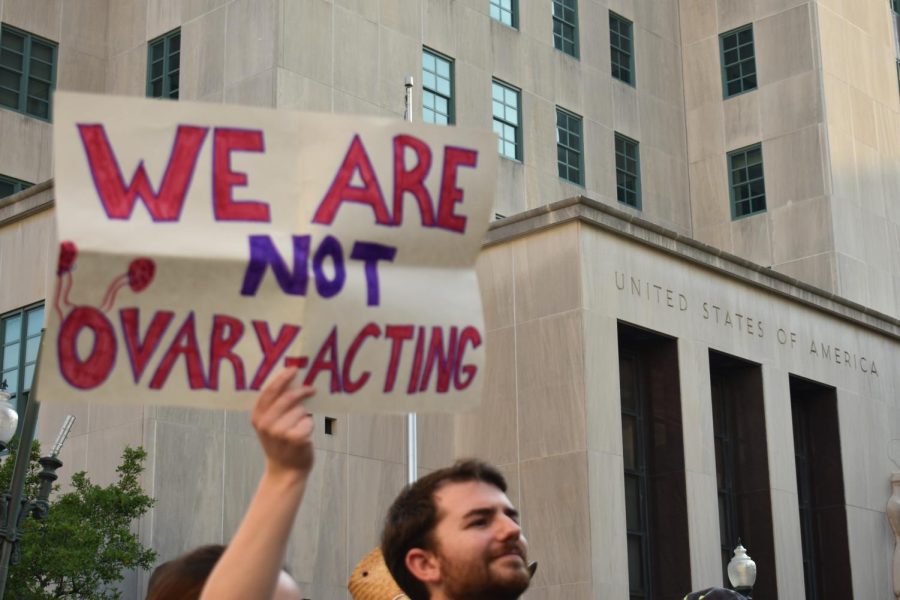Loyola community members protest overturn of Roe v Wade
June 27, 2022
Hundreds of pro-abortion rights protesters gathered to march in New Orleans last Friday, and Loyola students were among them after the Supreme Court ruled to overturn the constitutional protections of abortion established in Roe v. Wade.
The court’s decision in Dobbs v. Jackson Women’s Health Organization overruled the 50-year precedent that abortion rights are constitutionally and federally protected, which was set in the court cases Roe v. Wade and Planned Parenthood of Southeastern Pennsylvania v. Casey. The protesters met in front of the Louisiana Fifth Circuit Court of Appeals, and from there, marched to City Hall. Loyola students Anne Suchan and Saskia Walker were among those who attended the demonstration.
How this ruling affects the Loyola community
Walker, a senior, said it was a necessity for her to attend the march.
“I was talking to my family earlier and telling them ‘it’s about human rights.’ It’s not even about women’s rights because everybody is affected,” Walker said.
Walker and Suchan said this decision especially affects college students. Suchan, a junior at Loyola, said she believes abortion is only the first part of reproductive health care that will be banned.
“These are young girls who are in a situation in which they are in need of help, and the government is saying, ‘we are not going to help you,’” Walker said. “It’s just so detrimental to somebody who’s already so vulnerable in a situation of being pregnant when they don’t want to be.”
Carrying her baby as she marched in the crowd, a Loyola professor, who chose to remain anonymous fearing retaliation, also protested the Supreme Court’s decision.
“I have a daughter and am afraid of raising her in a state that views her as a second-class citizen,” she said.
How this ruling affects the New Orleans community
District B Councilmember and former Loyola Chief of Staff Lesli Harris attended the rally in support of demonstrators. Harris encouraged people needing healthcare to visit the Louisiana Abortion Fund.
As for how this decision will affect the city of New Orleans, Lesli Harris said history has shown that industry leaves places where rights are taken away. She said that because of that, this Supreme Court decision to overturn Roe “absolutely could have an economic impact.”
“We really just need to pay attention to what is happening right now. We’re talking about rights and independence, and this is an attack on all of us,” Harris said. “We all need to be aware and fight for the future.”
Orleans Parish District Attorney Jason Williams announced in a press conference on June 24 that he would not prosecute those who seek or perform abortions.
“We are not about to start investigating the decisions that a woman makes with her body,” Williams said at the conference. “We have more cases queued up for trial that need to be resolved in the area of first (and) second-degree murder, manslaughter, (and) armed robbery.”
How this ruling affects the Louisiana community
Following the Supreme Court’s decision, Louisiana’s trigger law went into effect. A trigger law is a law passed, which is enacted due to a key factor changing in the future, which in this case, was marked by the overturn of Roe v. Wade.
Louisiana’s trigger law prohibits anyone from prescribing, administering, obtaining, or selling any medicine with the intent of causing an abortion. On June 21, Louisiana Governor John Bel Edwards signed two laws that would further criminalize abortion care-related issues which contain no exceptions for situations of rape or incest.
One law would make it harder for those to have access to abortion-inducing drugs and the other law states that doctors who perform abortions could face one to 10 years in prison.
Demonstrators at the rally spoke of how the decision to overturn Roe will negatively affect Black, Brown, and low-income Louisiana residents that are seeking reproductive healthcare. Black women in Louisiana make up 58% of all pregnancy-related deaths although Black women only account for 37% of births in the state, according to a 2018 report by the Louisiana Department of Health.
The Department of Health also reported that 67% of pregnancy-related deaths in Louisiana could have been prevented.
The closest states Louisiana residents can now receive an abortion are North Carolina, Illinois, Kansas, or New Mexico. Harris said many people will have to turn to online resources to try to find safe access to abortion.
Walker said she worries about many women who might be in need of abortion services.
“As many of these signs say, abortion is healthcare, and this is not going to stop abortion from happening. It just makes it less safe,” Walker said.
Note: As of June 27, 2022, a New Orleans judge has temporarily blocked the state’s abortion ban until July 8. The court will consider a legal challenge to the ban from a Shreveport abortion clinic, which plans to resume administering abortions tomorrow.










jeff cotten • Jul 12, 2022 at 12:55 pm
I’m fine with a Catholic university’s newspaper giving the pro-choice side, but I’m wondering why it didn’t give equal or at least minimal coverage to the pro-life side.
As a reporter and news outlet, don’t you want to provide the views and/or facts from both sides?
Did The Maroon publish another article that was only focused on the pro-life side of the overturning of Roe? Maybe I missed it.
Thank you for your publication.
Bailey • Sep 2, 2022 at 5:13 pm
Given that a pro-life org is allowed on campus but pro-choice orgs are disallowed, this seems like one of the most appropriate spaces for pro-choice students to express themselves freely.
Loyolanonymous • Jul 5, 2022 at 2:06 pm
Meanwhile, the rest of the Loyola commnity celebrated life and the Supreme Court decision!
Paul • Jun 28, 2022 at 10:57 am
When will Loyola finally shrug off the idea that they’re a Catholic University?